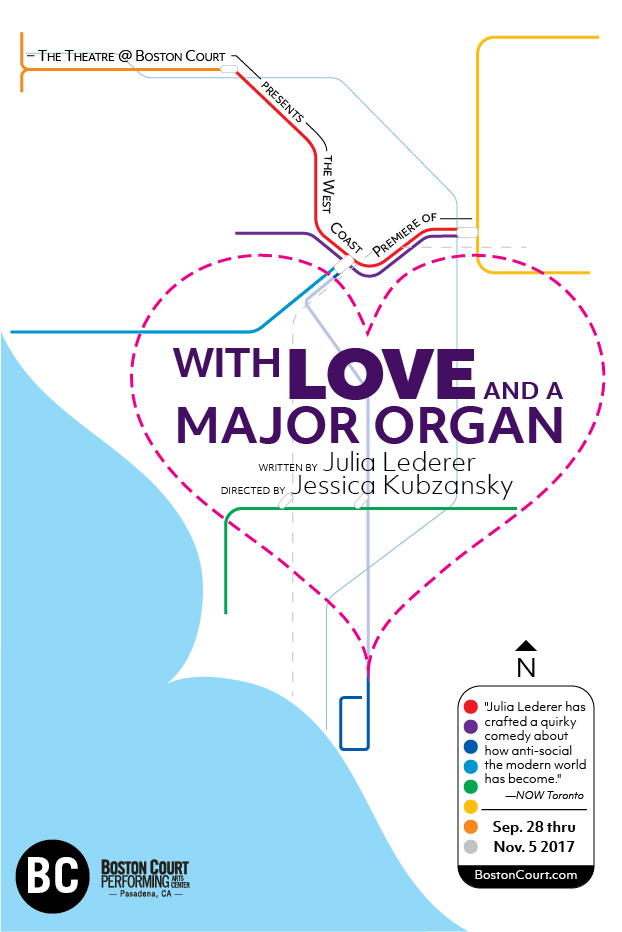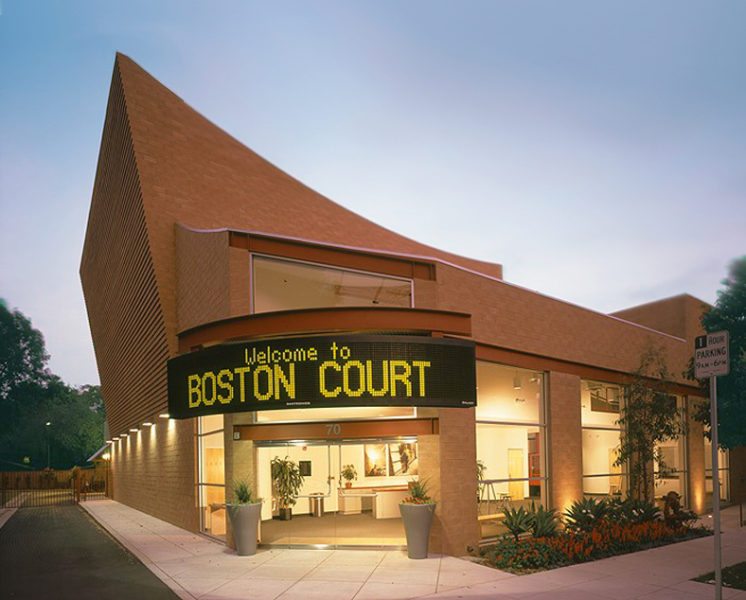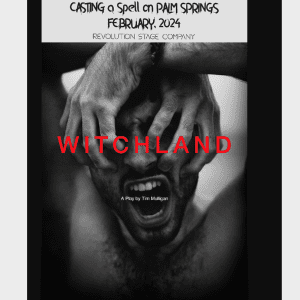 View Winners →
View Winners → ‘With Love and a Major Organ’ Boston Court’s Last Play for the Season


By May S. Ruiz
Boston Court Performing Arts Center in Pasadena ends its 2017 season with the West Coast premiere of Julia Lederer’s ‘With Love and a Major Organ’, from September 28 through November 5, 2017.
Directed by award-winning co-artistic director, Jessica Kubzansky, ‘With Love and a Major Organ’ is a whimsical, quirky, and wildly original play that dissects physical human interaction in the age of technology. Its title alone is startling and it was what attracted her to the play at the outset.
Says Kubzansky, “I love this title and I think it’s deliciously funny. The story is about trying to connect in our ever more virtual world. There’s a character in the play who has been enclosed for years in her own privacy. She’s seeing an online therapist, Google Shrink, who recommends that she see more people so she speed-dates online. What’s contrapuntal to this is there’s another character who falls in love with a stranger she meets on the subway. She then gives her actual beating heart to this man and he disappears on her.”
‘With Love and a Major Organ’ follows the protagonist’s quest to retrieve her heart, accidentally cracking open those of others she meets on the way. The play is eccentric and edgy comedy about what it costs to give your heart away, and what happens when you discover you actually have one.
“To me one of the most profound ironies of our time is that we have never been more connected yet we have never felt more isolated,” Kubzansky declares. “There’s this amazing animation that someone made about people running around looking down on their phones – technology is changing their lives but they’re completely missing out on life around them. Technology is significantly improving our lives while considerably reducing our ability to connect.
Julia’s play is both truly hilarious and powerfully heartbreaking. She’s mining both the absurd lengths to which love will drive us and the deep loneliness that emanates from protecting our frequently bruised and broken hearts. Her text is poetry for the theatre and she pushes metaphor to its most surreal and deeply truthful limits.”
Boston Court Performing Arts Center was founded in 2003 as a non-profit arts center dedicated to new and original works by living artists. Led by co-artistic theatre directors, Jessica Kubzansky and Michael Michetti, it has successfully established its place among the numerous theatre companies in Pasadena.
“The journey has been exciting, challenging, and wonderful,” proclaims Kubzansky. “I’ve been extraordinarily privileged to have founded Boston Court with Michael. We had the thrilling task of creating the mission and vision for this place – it’s always stimulating for an artist to create what you want to share with the world.
We knew when we started that Boston Court is only four blocks from the Pasadena Playhouse; we realized we needed to offer something different. Frankly, the design of the place dictated many things: it’s beautiful but it’s also very intimate. It’s important for us to do risky, adventurous work because we have fewer seats to fill; we can afford to take chances in our programming.
Also, it’s imperative for me to do work that challenges both the artist and the audience – plays that encourage each artist to passionately pursue his own unique voice and vision. We don’t want cookie-cutter productions or something our audience can see somewhere else. We look for a variety of styles and we significantly reinvent the classic. The only time we wouldn’t re-envision a classic is when it’s highly theatrical, textually rich, and visually arresting on its own – something we call a ‘Boston Court play’.
We put on four productions per season – usually one wildly re-envisioned classic; a world premiere; maybe one we had in our New Play Festival that subsequently ends up on our stage; and one that’s timely and needs to be done now. It’s all about passion and balance, but always the mandate is the same – it has to be highly theatrical, textually rich and visually arresting.”
Kubzansky and Michetti actively seek out like-minded collaborators. She states, “When Michael and I meet with directors we would like to work with, we ask ‘What has been burning a hole in your gut? What do you need to talk about right now?’ Both of us have really astonishing experiences when it comes from our gut.”
According to Kubzansky it took a while for them to fully grasp what sets Boston Court apart from other theatre companies in the area. She states, “It was much later, when our season had entirely world premieres and we had to extend every show, that it became clear to us that our audience liked the plays they’ve never heard of before. People now know that when they come to Boston Court, they will have a quality ride; they are confident that no matter what they see here it’s going to be a great evening.
Because our work is adventurous, it occasionally divides or offends people. But they also trust that they will see artistic excellence and the experience will be unlike what they get elsewhere. It’s incredibly important to us to take part in a cultural conversation that reflects the world as it is today. We ask our audience to be moved and to think – to crack open their heart and mind a little bit.
In Los Angeles, you see a play, get in your car, and drive away. But in New York, after the show you go to a bar next door, bump into people who also saw the play, and have a discussion about it. We want to bring that kind of engagement in the Pasadena theatre scene. Every Friday we have complimentary wine, sparkling water, and Chex Mix to encourage people to sit in our beautiful lobby and have a dialogue about what they had just seen.

Boston Court Performing Arts Center and its beautiful lobby – Courtesy photo
There’s a misconception that theatre-goers in Los Angeles don’t have the same passion for it as New Yorkers. It may be true that a much larger percentage of the population on the East Coast sees a play on any given night – it’s so easy for them to go on the subway then get off after four stops. Los Angelenos are also passionate devotees and there are so many choices of theatres here, too. However, I think that geography has something to do with it – if you live in Venice and want to see a play here, you have to make a commitment in terms of the drive. Fortunately, Boston Court attracts subscribers from far afield – which is very thrilling. Pasadena is a beautiful place; it’s a really complex community and it’s exciting for us to be here.”
Before Boston Court existed, the place it now occupies was a parking lot. It was purchased by philanthropist, Z. Clark Branson, to build a state-of-the art, intimate facility designed to bring artists and audience closer together. The 75-seat Marjorie Branson Performance Space and the 99-seat Main Stage are sites for the theatre’s season of bold, risky theatre and its eclectic, diverse music series. It is also the home of an annual New Play festival, an Emerging Artists Series, as well as Upfront, a rotating visual arts program.
As Kubzansky relates it, the theatre company’s name was born out of their desire to come up with a moniker that conjures permanence, heft, and gravitas. “We wanted something iconic like the Actors Theatre of Louisville or the Pasadena Playhouse – both of which were already taken. When we realized our building is located on Mentor Avenue and Boston Court, a lightbulb lit; we became Boston Court Performing Arts Center. We thought people will understand when they see that we named it after the street we’re on.
What’s funny is that after we had our logo created, stationery printed, and signs put up, we received a letter from the City of Pasadena informing us that our address was in fact 70 N Mentor Avenue; Boston Court was actually our driveway,” Kubzansky says with a laugh.
That inadvertent address error couldn’t have deterred its founders’ resolve to make their mark on the city and theatre. Boston Court Performing Arts Center stands today as a stalwart advocate of artistic vision and inventive expression.










































































































